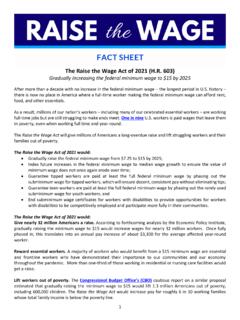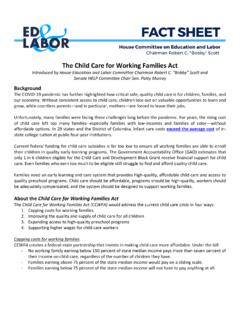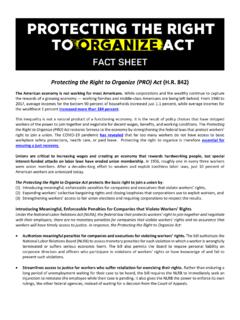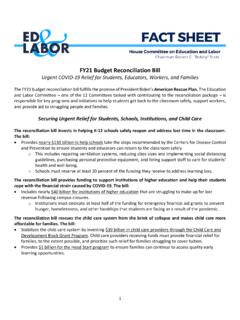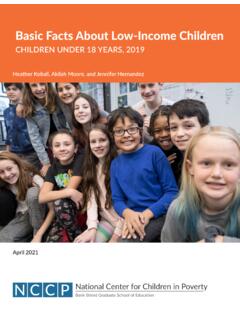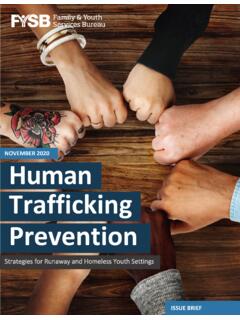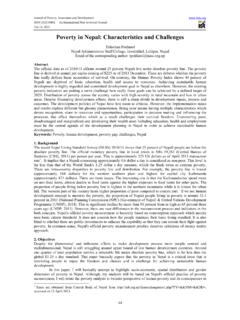Transcription of Raising the Minimum Wage: Good for Workers, Businesses ...
1 1 Raising the Minimum Wage: Good for Workers, Businesses , and the Economy The real value of the federal Minimum wage has declined 24 percent since 1968. Today, the federal Minimum of $ leaves an adult with two children thousands of dollars below the federal poverty threshold. This is unacceptable. 2150, the Raise the Wage Act, would increase the federal Minimum wage to $12 by 2020, eliminate the tipped Minimum wage, and link the Minimum wage to increases in the median wage after 2020, so that its value does not erode over time. According to the Economic Policy Institute, this modest increase would give nearly 35 million workers a raise (28 million directly and 7 million indirectly) and lift approximately million people out of poverty .
2 Raising the federal Minimum wage will also stimulate consumer spending, help Businesses bottom lines, and grow the economy. A modest increase would improve worker productivity, and reduce employee turnover and absenteeism. It would also boost the overall economy by generating increased consumer demand. Businesses Support Raising the Minimum Wage Business executives support a higher Minimum wage. A survey conducted by Republican pollster Frank Luntz that was leaked to the Washington Post in April found that 80 percent of business executives supported increasing the Minimum wage. Small business owners support a higher Minimum wage. A national poll of small business owners conducted by the American Sustainable Business Council found that 60 percent of small business owners support increasing the federal Minimum wage to $12 by 2020 and indexing it to inflation.
3 Businesses are voluntarily Raising wages. Hundreds of Businesses across the country have pledged to pay their workers at least $12 an hour by 2020. Businesses Will Benefit from a Modest Increase in the Minimum Wage Raising the Minimum wage increases worker productivity. Studies by leading economists, including Nobel laureate George Akerlof of Georgetown University, found that employee morale and work ethic increase when employees believe they are paid a fair wage. Economists have also linked higher wages to better physical and mental health and reduced decision fatigue, leading to higher productivity. Raising the Minimum wage reduces turnover. Higher wages lead to lower employee turnover, resulting in reduced recruiting and training costs.
4 An analysis by the Center for American Progress estimates that the cost of replacing low-wage workers is equal to about 16 percent of the employee s annual salary. A 2012 study by Arin Dube, William Lester, and Michael Reich concluded that increases in the Minimum wage can reduce turnover substantially, leading to savings in turnover costs. 2 Raising the Minimum wage reduces absenteeism. When workers earn higher wages they are absent from work less, leading to increased productivity. A 2010 paper from economists Laura Bucilia and Curtis Simon concluded that higher Minimum wages are associated with lower rates of absenteeism for reasons other than illness. Raising the Minimum Wage Boosts the Economy Raising the Minimum wage does not kill jobs.
5 Leading economists have found that increases in the Minimum wage have no discernible effect on employment, including employment in high-impact sectors like restaurants and retail. Recent experience in cities that have raised their Minimum wages provides further support. San Francisco increased its tipped Minimum wage to $ , before tips, and experienced positive job growth in the leisure and hospitality industry the following year. Raising the Minimum wage increases consumer spending and boosts the economy. A study by Doug Hall and David Cooper estimated that a $ increase in the Minimum wage would increase the earnings of low-wage workers by $40 billion and result in a significant increase in GDP and employment.
6 A raise in the Minimum wage predominantly benefits low-wage workers, precisely those most likely to put additional income directly back into the economy, kick starting a virtuous cycle of greater demand for goods and services, job growth, and increased productivity. Raising the Minimum Wage Has Bipartisan Support Red and blue states have recently passed Minimum wage increases. Since 2014, 16 states have raised their Minimum wage, including red states like Alaska, Arkansas, Nebraska, South Dakota, and West Virginia. Republican and Democratic presidents have supported Minimum wage increases. Twelve presidents, including Republicans Eisenhower, Nixon, Ford, George Bush, and George W. Bush, have signed legislation increasing the federal Minimum wage.
7 Across party lines, Americans support an increase in the Minimum wage. A national survey conducted by Hart Polling found that 75 percent of Americans support Raising the federal Minimum wage to $ by 2020 including 92 percent of Democrats, 73 percent of Independents, and 53 percent of Republicans.
